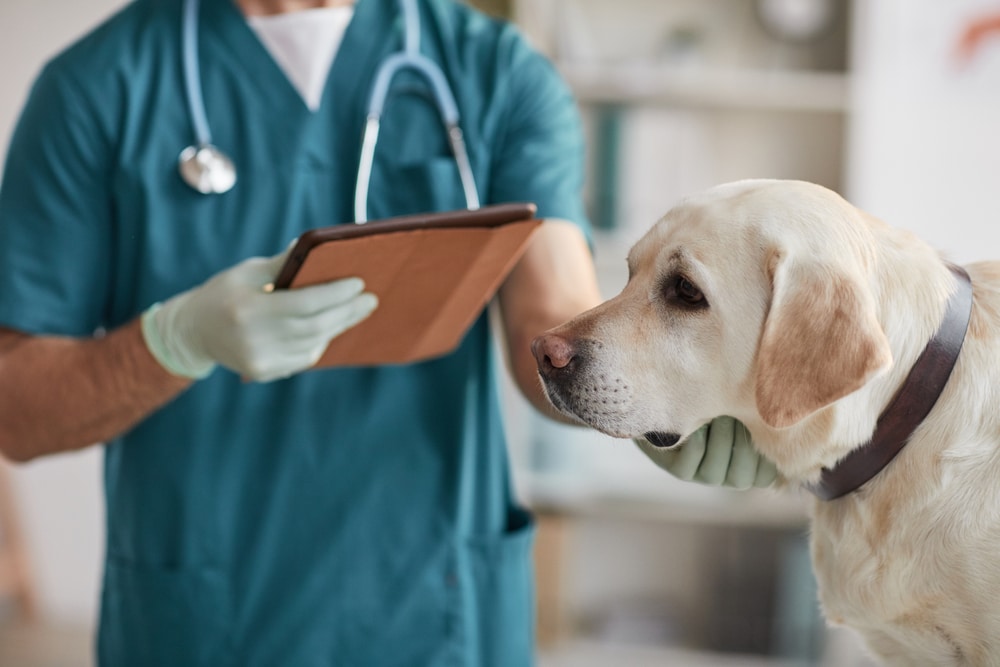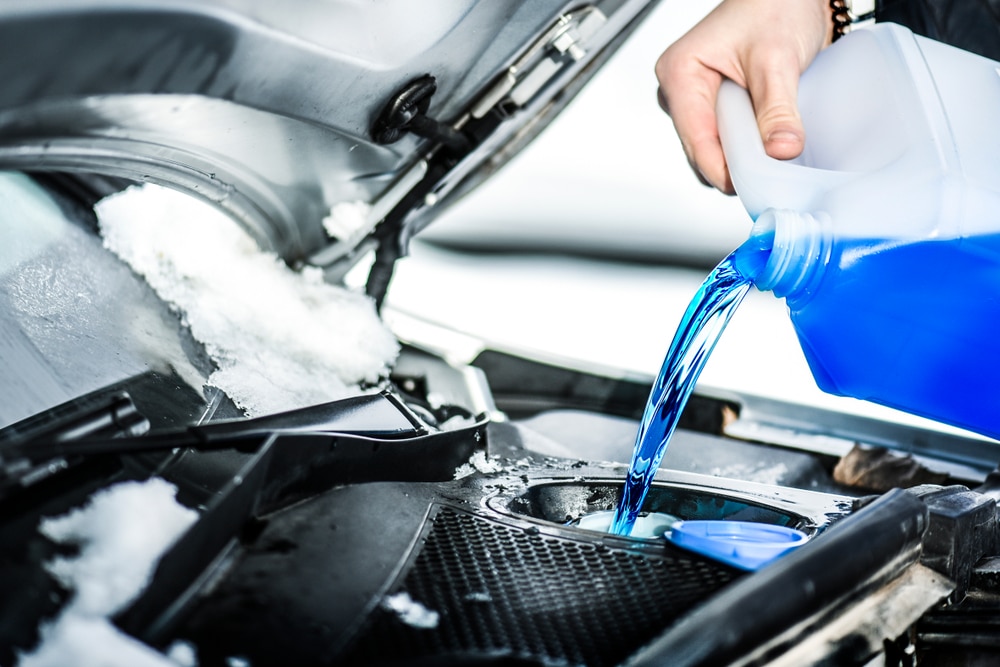Dogs are known for getting into things they shouldn’t, and sometimes this can lead to deadly consequences. Ethylene glycol is a common source of toxicity in dogs because of its sweet flavor and use in most automotive antifreeze products. Ethylene glycol toxicity is extremely serious and requires immediate veterinary attention. One possible treatment is alcohol, but what alcohol do you give to a dog to neutralize antifreeze?
Among other treatments, 4-methylpyrazole is used to stop the metabolization and production of toxic byproducts in ethylene glycol toxicity. Ethanol (a type of alcohol) administered IV is an alternative treatment, however, it is used less frequently due to the risk of side effects. If alcohol is used in the treatment of antifreeze poisoning for a dog, it must be done in a hospital setting under direct veterinary supervision. There is no at-home cure for antifreeze toxicity, therefore preventing ingestion and immediate veterinary care upon ingestion are critical.
Table of Contents
- What Is Antifreeze (Ethylene Glycol) Toxicity In Dogs?
- Stages And Symptoms Of Antifreeze Toxicity In A Dog
- How Do You Diagnose Antifreeze Toxicity?
- How Do You Treat Antifreeze Toxicity In Dogs?
- How To Prevent Antifreeze Toxicity In Dogs
- Conclusion: What Alcohol Do You Give A Dog To Neutralize Antifreeze?
What Is Antifreeze (Ethylene Glycol) Toxicity In Dogs?

Ethylene glycol is a common ingredient in antifreeze (and may be found in other automotive and household products) that is extremely toxic to a dog. Ingesting only a small amount of this sweet-tasting liquid can affect their nervous system and kidneys, and, if not treated promptly, can lead to death.
Stages And Symptoms Of Antifreeze Toxicity In A Dog
After a dog ingests ethylene glycol, its gastrointestinal tract quickly absorbs it. The kidneys excrete some, but the body metabolizes the rest. Through this process, toxic byproducts form.
There are three stages that occur after a dog ingests antifreeze. Initially, the symptoms are similar to alcohol intoxication. The dog will seem to improve for a brief period, however, as the dog further metabolizes the toxin, it begins to cause significant and lasting damage to the kidneys.
Stage 1 (Within 30 minutes Of Ingestion)
- Wobbly gait or incoordination (ataxia)
- Disorientation
- Nausea, vomiting, and diarrhea
- Increased thirst and urination (polyuria/polydipsia)
- In severe cases, tremors, seizures, or fainting
Stage 2 (12 To 24 hours After Ingestion)
- Brief improvement in symptoms
- Dehydration
- Increased heart rate and respiratory rate
And Stage 3 (36 To 72 hours After Ingestion)
- Signs of kidney failure: painful and enlarged kidneys, lack of urine production
- Increased heart rate and respiratory rate
- Dehydration
- Nausea, vomiting, salivation
- Lethargy, depression
- Possible seizures, coma, and death
How Do You Diagnose Antifreeze Toxicity?
The easiest way to diagnose antifreeze toxicity is based on if a pet parent sees their dog ingest antifreeze. If you don’t witness ingestion then a diagnosis can be more difficult. Time is of the essence, and your vet will need to rely on a physical exam, blood, and urine testing.
There are two tests that can evaluate blood levels of ethylene glycol. However, these tests may not always be available and become less accurate as more time passes and blood levels decrease. Moreover, changes in blood pH can occur within hours of ingestion. Also, other changes in bloodwork may include elevated kidney values (BUN (blood urea nitrogen) and creatinine). These are indicators of kidney disease, are not specific to antifreeze toxicity, and, if elevated, indicate that significant damage has already been done to your dog’s kidneys.
Evaluating a urine sample can also show evidence of kidney failure including dilute urine and the presence of blood, protein, and casts. Monohydrate calcium oxalate crystals are also common with ethylene glycol ingestion.
How Do You Treat Antifreeze Toxicity In Dogs?
Most important, for a successful treatment, administering must happen within the first 8-12 hours after ingestion. The goals of treatment are to decrease absorption of the toxin, prevent further production of toxic metabolites, and manage any damage that has already occurred. This condition is critical, and any chance of recovery requires prompt and aggressive treatment in a veterinary hospital.
Induction Of Vomiting And Activated Charcoal
So, if you can get your dog to a vet within two hours after ingestion, they may be able to induce vomiting and/or administer activated charcoal. This can help remove ethylene glycol that the intestines have not yet absorbed.
IV Fluids
IV fluid therapy will help to treat dehydration and increase the excretion of ethylene glycol via the kidneys.
4-Methylpyrazole Or Ethanol
This is the antidote to antifreeze toxicity, however, in order to be effective it must be given as soon as possible, within the first 8-12 hours after ingestion. 4-methylpyrazole is the preferred treatment and causes fewer side effects, however, ethanol (a type of alcohol) is also suitable. Both treatments work by inactivating alcohol dehydrogenase, stopping the body from converting ethylene glycol into its toxic metabolites. A vet administers them intravenously over multiple doses, and they require close monitoring.
Treatment For Kidney Failure And Other Symptoms
Additional treatment will aim to alleviate clinical signs such as seizures/tremors, protect the GI system, manage blood pH, and support kidney function. Unfortunately, once kidney failure has begun, the prognosis is very poor.
How To Prevent Antifreeze Toxicity In Dogs
The best way to keep your dog safe from antifreeze toxicity is to prevent ingestion from occurring. Look for pet-safe antifreeze products that contain propylene glycol instead of ethylene glycol. While dogs shouldn’t ingest propylene glycol either, and, if they do, a veterinarian should treat them, it is less toxic than ethylene glycol.
Seal, mark, and keep out of reach all products containing ethylene glycol. Check vehicles routinely for any leaks, and avoid leaving your dog unsupervised in high-risk areas, such as the garage.
Conclusion: What Alcohol Do You Give A Dog To Neutralize Antifreeze?
In conclusion, ingestion of antifreeze is an emergency that requires immediate veterinary attention. While not the preferred treatment, one possible antidote is ethanol, but a vet must administer that.
If you are concerned that your dog has ingested antifreeze contact your vet immediately. The Pet Poison Helpline is also available in North America by calling 855-764-7661 and online at www.petpoisonhelpline.com. Never give your dog alcohol at home.
So, what do you plan to do with your antifreeze now? How do you plan to keep your dog safe? Let us know your tips and why in the comments below!
